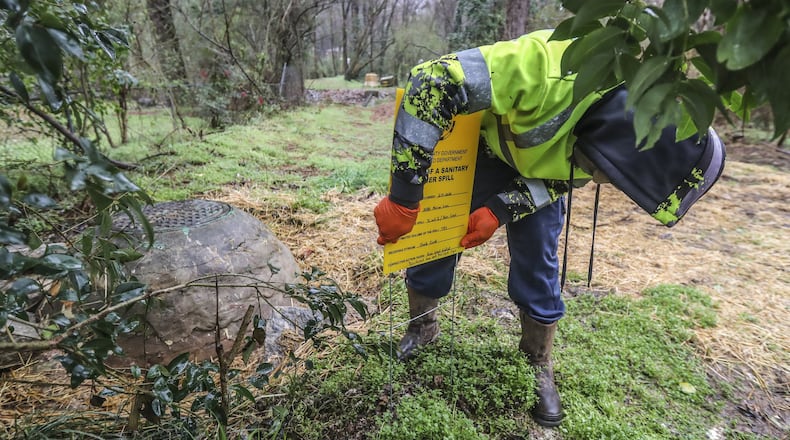Federal and state prosecutors have recommended approval of the new, billion-dollar legal agreement that would guide much-needed sewer fixes in DeKalb County, calling the proposed arrangement “fair, reasonable, and consistent with the Clean Water Act.”
The recommendation was filed in the U.S. District Court in Atlanta on Tuesday, nearly a year after DeKalb and environmental regulators reached an initial consent decree — and just a few weeks after Judge Steven D. Grimberg chided prosecutors for taking too long to review the case.
It’s now up to Grimberg to decide if the renegotiated agreement should be implemented. A timeframe for that decision is unclear.
DeKalb officials declined to comment on the prosecutors’ vote of support because it is considered part of pending litigation.
The county first entered a consent decree to fix its spill-prone sewer system in 2011, after a lawsuit accused the county of violating the federal Clean Water Act and other regulations. For nearly a decade, though, the county made little progress on the mandated repairs — whether due to mismanagement or outright corruption.
DeKalb CEO Michael Thurmond has made the sewer system a priority since he took office in 2017, but the county was well short of the original consent decree’s requirements when it expired last June.
The new agreement — which is the product of years of negotiations between DeKalb, the Georgia Environmental Protection Division and the U.S. Environmental Protection Agency — includes a $1.05 million fine against the county and a lengthy extension to complete the necessary work.
If approved, large-scale repairs in priority areas would need to be completed by Dec. 20, 2027. But the county would need to address a total of 103 repeat spill sites within the first four years (with at least half of them fixed in the first two years).
The modified consent decree also requires the county to file more extensive and frequent progress reports, and calls for increased fines if a set amount of sewer pipe is not rehabilitated each year.
It also includes a “capacity assurance program,” which will allow the county to bank credit for repairs and other projects limiting sewer spills. The county could then take incremental advantage of the “new” capacity that’s available and allow development projects that might otherwise be hampered by sewer issues to move forward more quickly.
That component has been a controversial one for many residents and environmental advocates, but a crucial addition for Thurmond and other DeKalb officials. The vast majority of the county’s sewer spills occur in what’s known as the Snapfinger basin, an area that covers south and western DeKalb, and hundreds of development projects in the area have been stalled by limited capacity.
“We want to grow in a smart way that not only improves our economic base but also protects the environmental treasures within our borders,” DeKalb Chamber of Commerce chairman James Tsismanakis wrote in a public comment submitted in support of the new consent decree.
Over the years, tens of millions of gallons of sewage have poured from DeKalb County’s rapidly deteriorating sewers, presenting ecological and public health threats by spreading bacteria like E. Coli in local waterways. Most of the county’s spills are triggered by weather: cracks, breaks and other imperfections in the county’s sewer infrastructure allow heavy rains to infiltrate the system and force sewage back out.
In the last 30 days alone, DeKalb has reported nearly 1.6 million gallons worth of spills, according to state EPD data. That figure accounts for 30 separate spills, though most of the volume came from a single incident at a frequent trouble spot near Lithonia.
The South River Watershed Alliance, a local environmental advocacy group, has long criticized DeKalb’s sewer repair efforts. The group submitted a lengthy document asking more than two dozen questions during the public comment period for the new consent decree, which ended in December.
SRWA board president Jacqueline Echols, who previously called the modified consent decree “a rush job crammed into an arbitrary and unrealistic deadline,” said Thursday she was not surprised that her comments and others did not result in any changes to the new agreement. She said it still lacked a firm deadline for eliminating spills in non-priority parts of the county, and was skeptical it would lead to Clean Water Act compliance even in prioritized areas.
Mary Hinkel, chair of the DeKalb Citizens Advocacy Council, was also among the 39 people to submit comments. She wrote that county residents “deserve stronger enforcement and oversight” of the sewer repairs.
State and federal prosecutors, meanwhile, wrote in their new filing that an extension of the deadline for repairs was “reasonable” given DeKalb’s “late start in implementation,” a reference to the years of floundering that took place during previous county administrations.
They also cited progress on repairs under the Thurmond administration and wrote that an assessment of DeKalb’s sewer system “revealed new challenges in areas not previously anticipated and that now require additional attention.”
The original consent decree was focused largely on eliminating issues caused by fats, oils and greases making their way into the system — not the weather-related infiltration now believed to drive the majority of DeKalb’s spills.
About the Author
Keep Reading
The Latest
Featured

